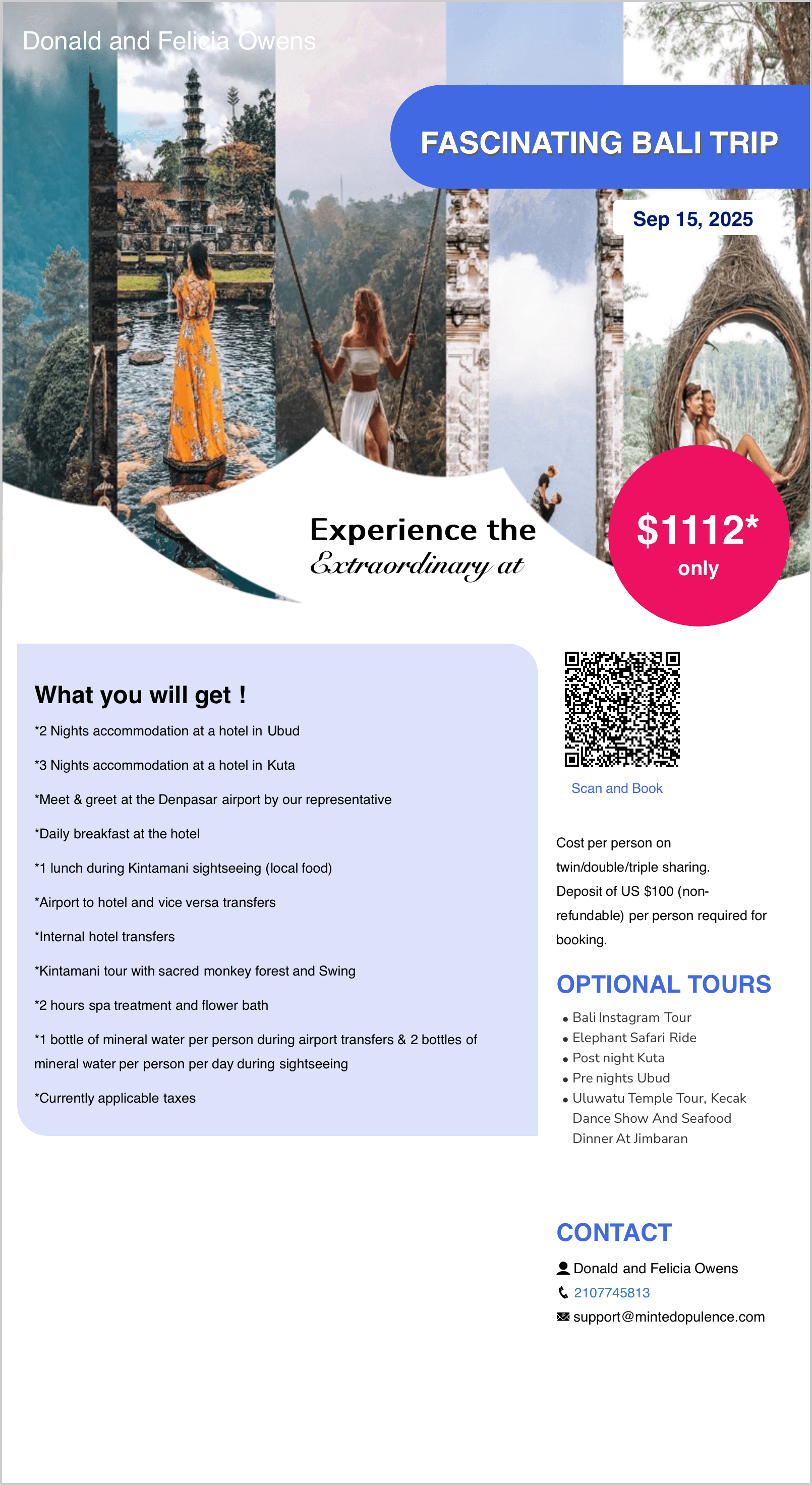Things To Do In Cape Town
There’s nowhere in the world quite like Cape Town. With the Atlantic Ocean on one side and the Cape Fold Mountain Range on the other, this dynamic city is brimming with attractions, places to explore, and hidden gems to uncover.
Whether you want to hike to the top of the iconic Table Mountain or spend some time exploring South Africa’s premier wine growing region, there can be no doubt that Cape Town is the ultimate destination to begin your exploration of South Africa, a truly diverse and fascinating country.
Where else can you enjoy world-class wine, fine dine, see spectacular coastline filled with whales, Great White Sharks and seals, or be go on a game drive and look out for the Big Five, all without breaking the bank?
You can easily spend a week or two exploring Cape Town and the nearby regions, but if you’re only visiting for a short period, don’t miss out on these unmissable things to do in Cape Town, South Africa.
1. Relax in Camps Bay
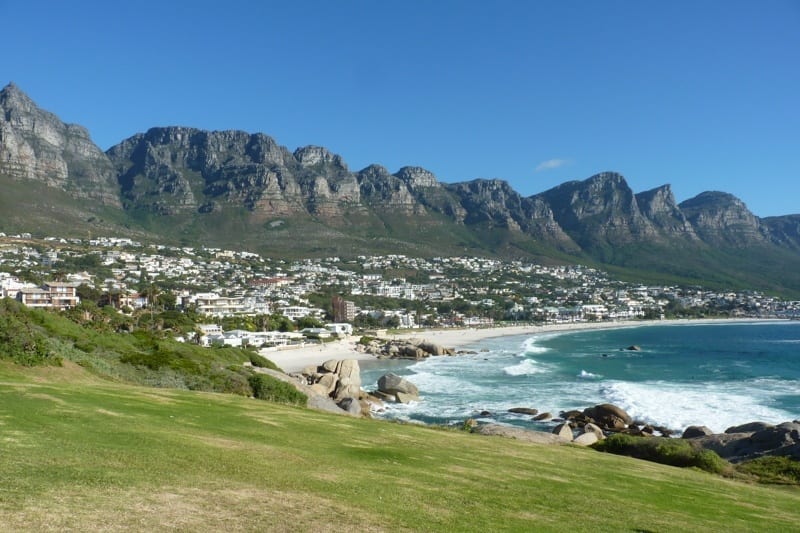
One of the best things about Cape Town is its location on the coast, backed by mountain ranges – so plan on spending lots of time enjoying the outdoors while you’re here.
If you haven’t settled on a place to stay yet, then consider Camp’s Bay – it’s a lovely seaside suburb that is very safe and offers great views of Table Mountain, Lion’s Head and the Atlantic Ocean.
It means you’re close to the Cape Peninsula and everything it has to offer, as well as the Table Mountain cableway.
It’s about a 10-minute drive from Camp’s Bay into the centre of Cape Town, but the centre can be a little dodgy in terms of safety, but Camp’s Bay has a better reputation for safety.

Camp’s Bay is known for its beach, which has excellent surf breaks and is where you’ll find many of Cape Town’s surfers catching the waves. The neighborhood has a great collection of cafes, restaurants and bars that flank the waterfront.
Make sure you try a steak at the Hussar Grill on Camps Bay Drive. This was a local recommendation and is THE place to go for steak in Cape Town. You won’t be disappointed.
2. Do A Walking Tour of The Bo-Kaap Neighbourhood
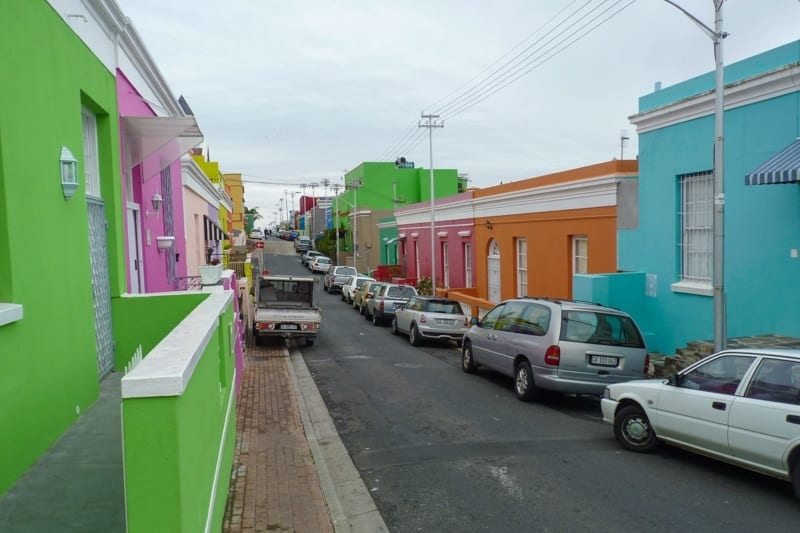
Exploring central Cape Town is a must and can be done in half a day. The main reason people come to Cape Town CBD is to see the colourful buildings of Bo-Kaap.
Although beautiful, Bo-Kaap wasn’t always the colorful neighborhood you see today.
Bo-Kaap is known for being where the cape Malay and Muslim immigrant population reside, and was once a neighborhood for the poor.

No one knows when the first house was painted, but once one house was painted a bright color, others followed, and soon the neighborhood turned a corner and became a desirable area.
Today, it’s still a multicultural neighborhood, with 56.9% of its residents identifying as Muslim, but the area went through a period of gentrification and now residents are now more lower to middle class.
As well as colorful homes, you can find small bakeries and cafes, boutique stores, art galleries and restaurants serving Cape Malay dishes.
3. Shop At V&A Waterfront
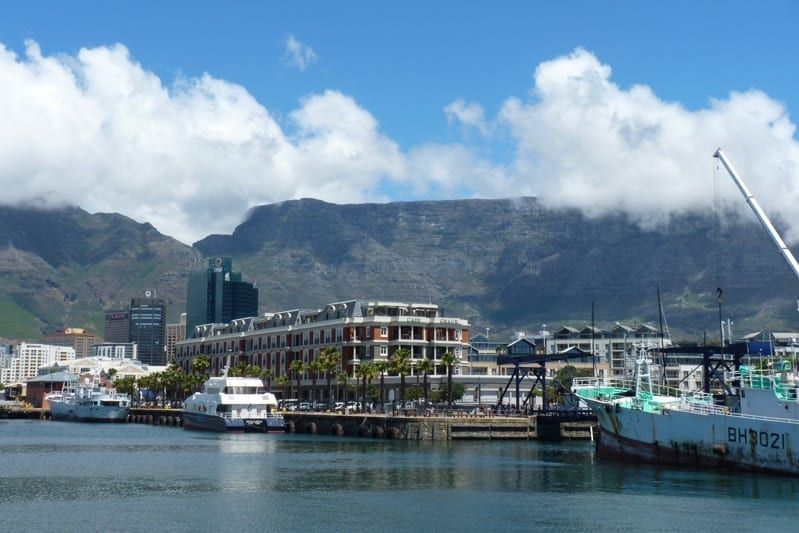
The waterfront is very commercial and you’ll feel like you could be anywhere, but there are certainly lots of places to eat, drink and places to enjoy the views to Table Mountain.
The mall on the waterfront, known as V&A Waterfront, is where you’ll find the most bustling atmosphere.
Everyone seems to congregate here on weekends, soaking in the scenic views and shopping for souvenirs.
Take a walk along Sea Point Promenade after a visit to the mall and see if you can spot some of Cape Town’s marine wildlife. During the winter months, June to December, you may spot migrating whales off the shores.
I highly recommend you go for a walk along the promenade at sunset and watch the sun illuminate Table Mountain and Lions Head behind you – it’s stunning!
4. Visit Robben Island and The Nelson Mandela Museum
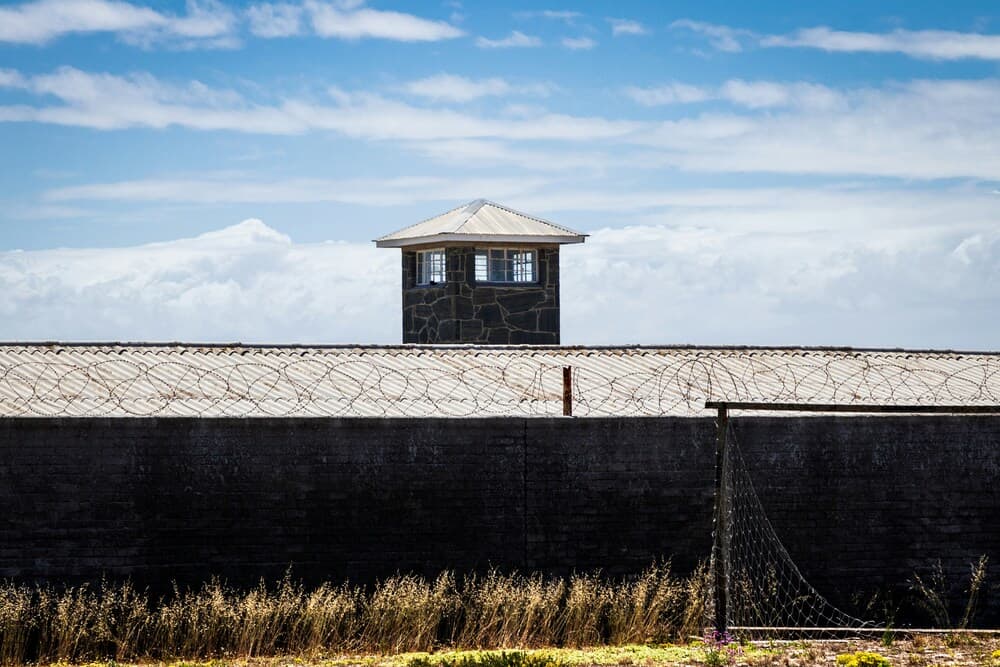
The Waterfront is also the departure point for tours to Robben Island, the infamous prison complex that once held Nelson Mandela.
A trip to Robben Island can be a frustrating experience because of the poorly organized nature of the tours where visitors face long queues for the ferry and are then loaded onto buses and driven around the island.
I just wanted to get out and explore but unfortunately, you can’t do that here.
The tours also regularly cancel due to rough tide conditions, so I recommend you book your tour for as early as you can in your trip to Cape Town so that if it does cancel you can reschedule for another day.
However, it is interesting to learn about the prison complex from the former inmates (all ex-political prisoners) who run the tours and you do get to view Nelson Mandela’s cell.
5. Explore the Cape of Good Hope
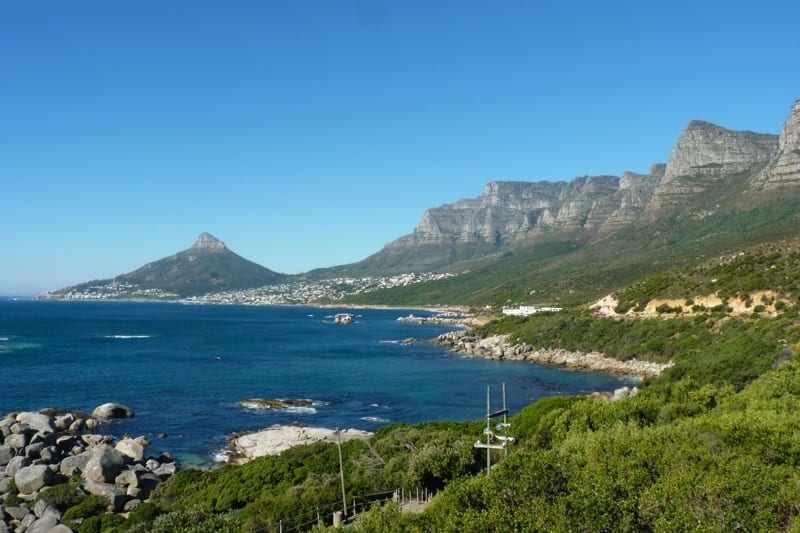
Spend a day driving around the Cape Peninsula and you’ll see some of Cape Town’s most beautiful nature sites.
The Cape of Good Hope, which is famous for being the point in which European settlers arrived on South Africa, is an area of the Cape Peninsula featuring dramatic headlands, beautiful beaches and rugged scenery.
The remote and unspoilt atmosphere of the peninsula will make you feel a million miles away from the city.
The cape forms part of the Table Mountain National Park and is the only part of the Table Mountain National Park that is fenced as it is home to a number of animals including zebra, eland and the red hartebeest.
Begin your drive on the Muizenberg side of the peninsula so you will be able to enjoy the setting sun on your return along the Chapman’s Peak Drive and Camps Bay side.
The untouched beaches along the Atlantic side are really very beautiful.

Chapman’s Peak is one of the most popular drives in all of South Africa.
The short drive (about 15 kilometres) runs to Hout Bay and hugs the side of Chapman’s Peak.
The views are spectacular, particularly if you’re arriving in the late afternoon when the sun is starting to set.
6. Visit the Penguins at Boulders Beach

The penguin colony at Boulders Beach in Simon’s Town is another must-do thing to do in Cape Town.
You can walk along boardwalks down to the beach to watch the African penguins as they go about their business.
These little guys are funny to watch, particularly as they surf into the beach and climb around on the rocks.
Remember to look out for the penguins as you walk down towards the beach as they are often hanging out under the trees away from the water.
The main boardwalks down by the beach can get rather crowded so take your time to enjoy the penguins on your way down to the end of the main boardwalk.
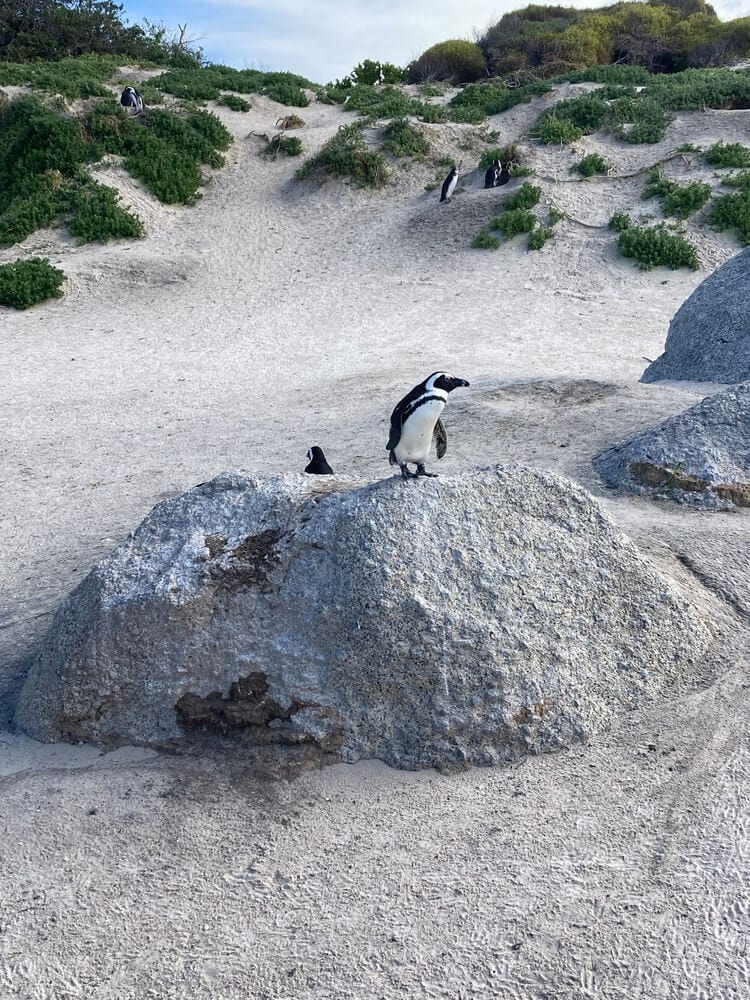
If you drive past the first access point to Boulders Beach and keep going to the second, there’s a small car park and a little café/restaurant with views over the ocean if you feel like a coffee break.
Be aware that penguins also like to sleep under the cars in the parking lot too, so check under your car before you drive off!
Accessing the penguin colony from this side means you follow a boardwalk back to the main entrance, but you will often spot penguins along the way. There is also a pretty little beach if you feel like a swim.
7. Watch Two Ocean’s Collide at Cape Point Nature Reserve
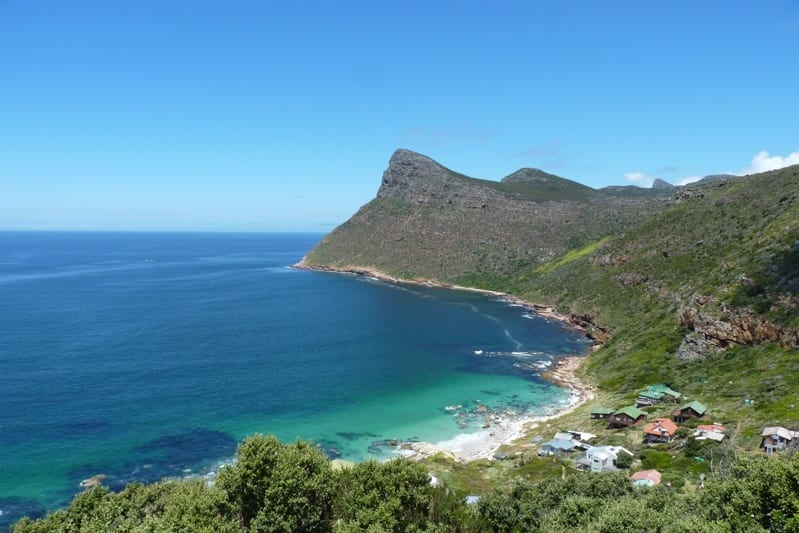
Cape Point is at the very tip of the Cape of Good Hope and there are a number of things here to keep you busy.
Make sure you do the Cape Point walk for some great scenery – at some points the cliffs are up to 200 metres above the ocean below.
It’s known as being the dividing point between the Indian Ocean and the South Atlantic Ocean.
The walk up to Cape Point Lighthouse is quite steep. If you’d prefer, you can catch the Flying Dutchman Funicular up instead.
Try and get a table on the deck of the restaurant at the base of the Flying Dutchman and enjoy lunch with spectacular views out over the peninsula and False Bay.
8. Hike Lion’s Head
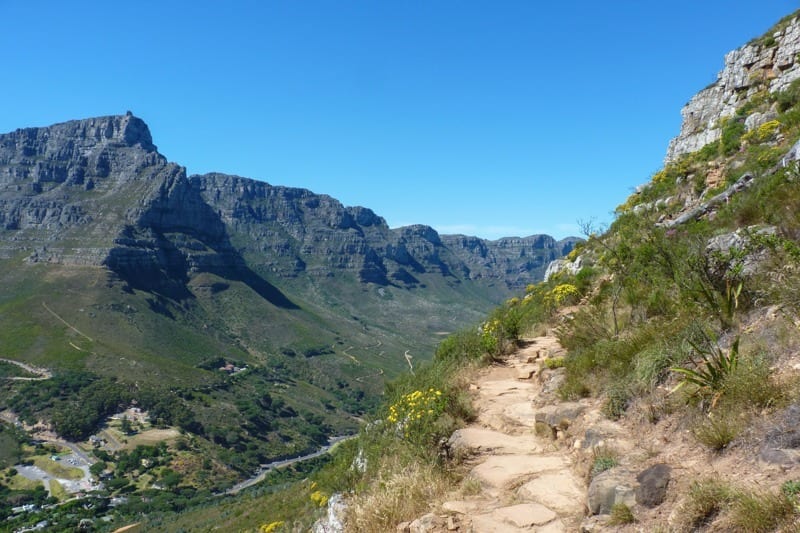
Hiking up Lion’s Head is a fantastic way to get outdoors and enjoy Cape Town’s spectacular scenery.
The trail circles the mountain and gives great views over the city – particularly Camp’s Bay, Green Point and of course, Table Mountain itself.
This is one of Cape Town’s most popular hikes because it’s only about 30 minutes to reach the top and gives you incredible views.

When you get towards the top of Lion’s Head the views of Table Mountain are simply stunning with the city nestled at its base.
The hike is steep and there is some scrambling needed in places. There are some challenging sections with staples, but you can also avoid those by taking longer detours.
There are chains and ladders along some of the rocky sections to help you climb the mountain.
9. Visit Franschhoek Wine Region
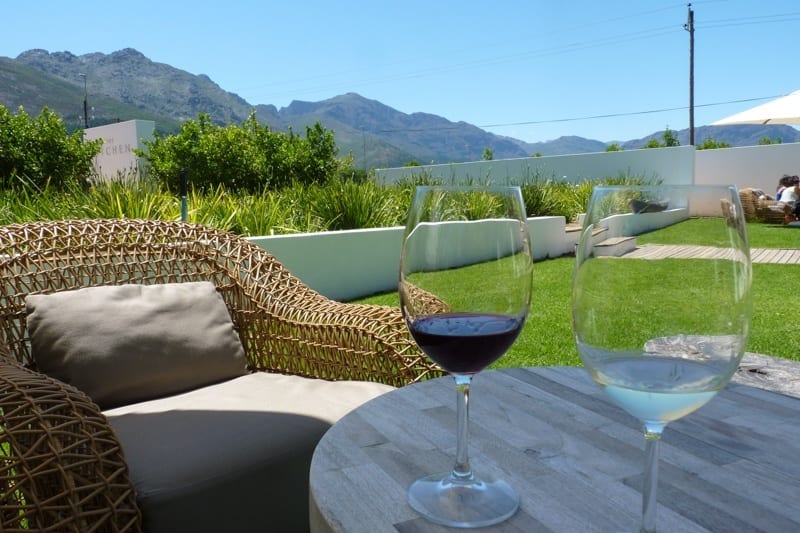
Just 45 minutes from Cape Town, is South Africa’s wine region, also known as Cape Winelands, which is internationally recognised for its outstanding food and wine and is a true foodie paradise.
I suggest you stay in Franschhoek, which is smaller and more picturesque than neighboring Stellenbosch.
Franschhoek is set among the Groot Drakenstein Mountains and is home to an incredible amount of outstanding wineries, restaurants and cafes.
A great way to explore the many wineries on offer is to book a ticket on the Wine Tram, which will shuttle you to and from many of the wineries where you can enjoy wine tasting experiences.
You can sample plenty of wine and food while enjoying the views of the vineyards, without having to worry about driving.
There are plenty of places to eat but I recommend you book well in advance for The Tasting Room at Le Quartier Francais, which is one of the world’s top restaurants.
If you don’t manage to get a reservation, they offer light meals in their bar and outstanding cocktails.
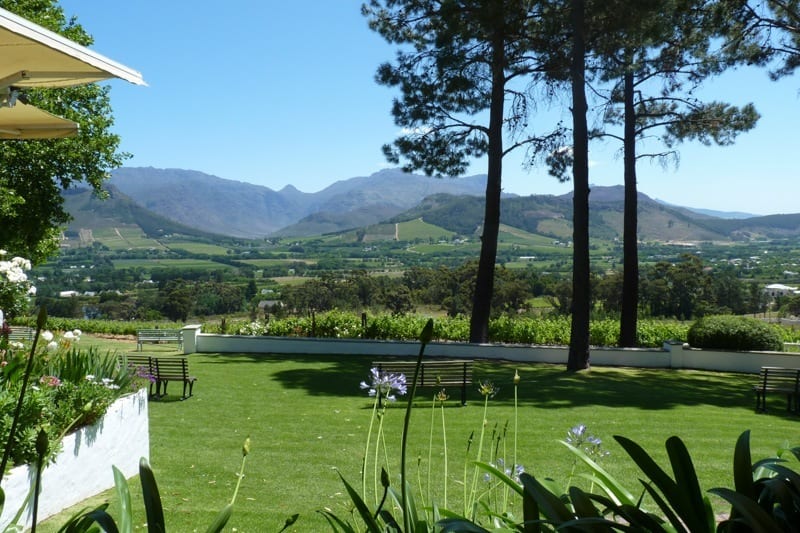
Lunch at La Petite Ferme is also highly recommended. Not only is the food outstanding, the views are simply superb.
The chef’s menu at Le Bon Vivant is fantastic – go for the wine pairings so all you need to do is enjoy the experience. The glass window through to the kitchen means you can watch the chef at work.
Finally, be sure to visit the historic Grande Provence Estate Restaurant which is one of the loveliest in Franschhoek. The cellar door is a great spot for tasting local wines and you can order from a small menu here.
10. Hike Up Table Mountain (Or Take The Cable Car)

Cape Towners love hiking, and you’ll find several hiking groups embarking on a hiking trail up Table Mountain almost every day (check out this Facebook group for hiking buddies!)
The hike up to the top of Table Mountain should not be underestimated no matter which trail you do.
For tourists, a good trail to follow is up Platteklip Gorge, which is the oldest hiking route on the mountain. It takes you up through a rocky gorge from the road. Its challenging because it’s so steep, but compared to other routes its much safer.

I love the Kasteelspoort route, which takes you up the Western slopes of the mountain to the rock formation known as “The Diving Board”.
It has amazing views of the Atlantic Ocean, and although challenging, didn’t feel as difficult as the Platteklip Gorge.
It’s further to walk though.
Don’t do the India Venster hike without a local to help you. You can follow trails on MapsMe but they are often not accurate and if you take a wrong turn you could fall off the cliff! It’s best to do that one with someone who has done it before.
Whichever route you take, be sure to visit the cafe at the top of the cable car station and warm up with a hot chocolate (it gets windy up there).
You can hike down through the Kirstenbosch National Botanical Gardens or get the cable car down if you’re done with hiking.
11. Visit the Castle of Good Hope

The Castle of Good Hope is a Dutch fortification in the CBD of Cape Town.
The bastion was built in the 17th century and was declared a historic monument in 1936.
It was built by the Dutch East India Company and is the oldest existing building in SA.
It served as a replenishment station for trading ships who voyaged from the Netherlands towards the East Indies (now Indonesia), which passed by Cape Town on route.
12. Mingle With The Locals at Mojo Market

Mojo Market is a food hall on the Atlantic Seaboard in the Seapoint Area.
It’s where you will find several small food establishments selling everything from burgers to burritos to biltong.
It’s a popular meeting point for locals and has several bars where you can get locally made wines and craft beers, and there’s regularly live music happening throughout the day on the weekend and in the evenings.
It’s the place to be for food, and for getting a feel for the local community.
13. Paraglide from Signal Hill

If you’re feeling adventurous, take to the slopes of Signal Hill for some paragliding!
If you’ve never been paragliding before, then you can join a tandem paragliding tour, where you can experience a 15-25-minute flight of Cape Town from the launch site on Signal Hill.
It’s certainly a unique way to experience the cityscape views!
14. Learn About Social Economic Issues at District Six Museum
During the Apartheid era, Cape Town underwent a major gentrification regime of its CBD.
The government wanted to create a wealthy, white-only central area where international businesses could operate and boost the economy of South Africa.
To do this, they forcibly moved residents from District 6 out of the city and placed them in surrounding suburbs.
When international companies learned what had happened, they didn’t want to locate in the area, and so much of this neighborhood is now empty.
You can learn about the families, the communities, and about life in District 6 before the residents were removed at the District 6 Museum.
This museum is small and has a lot of reading, but it’s a good place to learn about some of the social-economic troubles that has happened in Cape Town.
15. Take the Free Apartheid to Freedom Walking Tour

South Africa has a turbulent history. Many people still remember the Apartheid, in which South Africa’s racial communities were separated for 46 years.
There are two important places where you can learn about the Apartheid history in South Africa, The Apartheid Museum in Johannesburg, which if you plan to head that way is well worth a visit, and on the free Apartheid to Freedom walking tour in Cape Town.
The walking tour takes you to places that were important during the Apartheid era (1948 to 1994) including the court house where all communities had to register their race. Outside the courthouse are benches with “white only” and “non-white only” written on them, one of the few remaining monuments of this era.
You will also be shown the church where Desmond Tutu, anti-apartheid and human rights activist, preached, as well as where Nelson Mandela gave his speech after being released from prison.
What are some things you are most excited to see in Cape Town? Share in the comments below.


